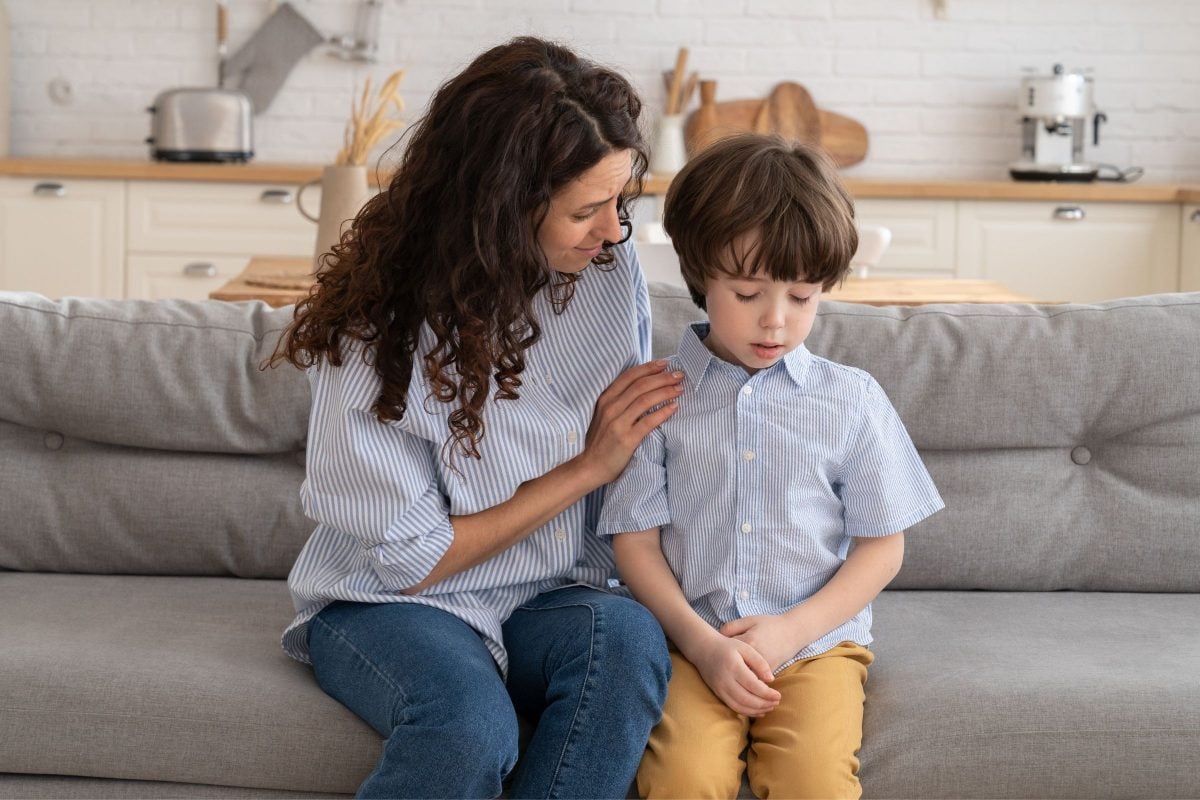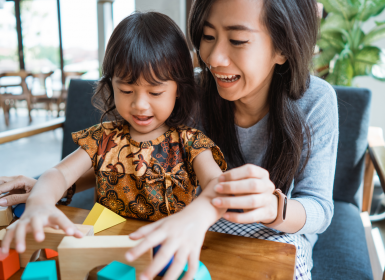What is Emotional Co-Regulation and Why is it Important?
Emotional co-regulation is an interactive process where parents, teachers or caregivers work together with children to help them manage their emotions. It starts in early childhood and lasts a lifetime. In this process, children learn to better respond to stressful situations and communicate their needs with others through the support and guidance of an adult. This is the first step in children learning self-regulation skills.
Emotional co-regulation plays a crucial role in supporting children’s healthy emotional development and equipping them with essential skills for managing emotions and relationships throughout their lives.
Emotional Co-Regulation Strategies for Different Age Groups
As children grow, their brains and regulation abilities develop. Though all children and youth need co-regulation support, different age groups will require different levels and forms of emotional co-regulation support. Other factors such as biology or temperament may also influence a child’s co-regulation needs.
Co-regulation strategies for infants
It’s never too early to start co-regulating emotions with your child. To do this, you need to pay attention to how they’re feeling and respond in a way that helps them feel better. Some simple ways to co-regulate with a baby include:
- Be patient and calm when responding to big emotions
- Help your child feel comfortable by holding them, rocking them, and talking to them in a soft and soothing voice.
- Calm them down by distracting them with toys or things they like
- Breathe slowly together.
- Give your baby a warm bath, a gentle massage, or playing soft music can also help them feel more relaxed.
By always using the same methods to help your baby when they’re upset, you’ll build a strong bond and trust with them.
Co-regulation strategies for toddlers
Toddlers are just starting to understand and experience a wide range of emotions, but they may still have trouble identifying and communicating what they’re feeling. Some effective co-regulation strategies to try include:
- Encourage toddlers to express their feelings through play, art, or physical activity. For example, playing with dolls or stuffed animals can help them act out different emotions and scenarios.
- Talk to them in simple, clear language about their emotions. For example, instead of saying “you’re angry,” you can say “you’re feeling mad right now.” This helps them to understand and label their emotions.
- Help toddlers feel comforted and reassured through physical touch. Hugs, cuddles, and other forms of physical affection can help them feel safe and secure.
Co-regulation strategies for preschool-aged children
Pre-schoolers grow fast in all ways, but it can be tough for them to control their feelings and understand how others are feeling, which can cause tantrums and other behaviours that are hard to deal with. But this is also a good chance to teach them how to handle their emotions by using co-regulation strategies.
- Teach pre-schoolers about their emotions through storytelling and play. For instance, you can read them a story about a character who is feeling an emotion similar to what they’re going through. This can show them that their emotions are normal and how they can be managed.
- Provide a supportive, non-judgmental listening environment to encourage them to talk about their feelings . This means that you listen to what they have to say without trying to fix the problem or make them feel bad. Simply letting them express themselves can help them feel better.
- Teach them basic coping skills like using positive self-talk to help them manage their emotions. By repeating positive phrases such as “I am brave and strong.” or “I can do this!” to themselves, the pre-schooler can feel more confident and empowered. Creating a calm-down corner with some cozy toys, rugs, or pillows can also help them manage emotions and stress.
Co-regulation strategies for primary school children
Primary school-aged children, who are between 5 and 11 years old, are learning how to handle complicated social situations and make good choices for themselves. They may also feel pressure to do well in school and with friends, which can cause stress and anxiety. It’s important for them to learn how to regulate these emotions through co-regulation so they can handle these challenges. Here are some key co-regulation strategies that can help:
- Start by helping children to identify and label their feelings. Encourage them to talk about their emotions and help them put words to their feelings. Art or writing activities can also give children a way to express their emotions.
- Help the child identify what triggers their emotional outbursts and develop a personalized “calm-down toolkit.” Exploring various calming techniques is key as what works for one child may not work for another.
- Demonstrate effective problem-solving skills for the child to learn through observation and imitation, such as breaking down problems into smaller parts and weighing the consequences of different options. This can help them to make better decisions.
- Give age-appropriate challenges such as puzzles, logic games, and tasks to help the child practice problem-solving and decision-making. Gradually increase the complexity as their skills develop and encourage independent thinking and decision-making to build their confidence and problem-solving skills. Meanwhile, teach collaboration and how to work with others to consider different perspectives and solutions.
- Provide opportunities for children to run, jump and play to help them release excess energy and reduce stress. Physical activity is an important way to support their emotional well-being.
Co-regulation strategies for adolescents
Adolescents are individuals who are between the ages of 11 and 18. During adolescence, many changes occur, both physically and emotionally. The brain develops and changes in many ways during this life stage, including the prefrontal cortex, which helps control emotions and prevent impulsive behaviour. Risk-taking is normal during this time as the brain looks for new experiences and skills. Adolescents can experience strong and fluctuating emotions, which highlights the importance of having supportive relationships and access to emotional co-regulation from trusted individuals. Here are some co-regulation strategies you can use with adolescents.
- Open communication and a safe, non-judgmental environment are important for supporting their emotional health. Encouraging them to share their feelings and providing an ear to listen can help them feel heard and understood.
- Help adolescents to build effective coping skills such as using mindfulness and relaxation techniques during difficult times. For example, you can teach adolescents to focus on their breathing, practice mindfulness meditation, or do yoga. These activities can help lower stress and improve overall well-being.
- Promote healthy habits such as regular exercise, self-care and a balanced diet. Engaging in activities they enjoy, such as sports can improve both their physical and emotional health.
- Encourage them to participate in clubs or community activities to help build social support networks and improve their overall emotional health. This can include things like joining a sports club or team, volunteering for a cause they care about, or connecting with peers who share similar interests. Connecting with others can be a valuable source of support for adolescents during this life stage.
Emotional co-regulation is a crucial aspect of development and well-being for individuals of all ages. It is important to understand that different age groups have unique needs and challenges when it comes to managing their emotions.
By understanding and implementing appropriate strategies for each age group, we can help individuals regulate their emotions effectively and lead happier and healthier lives.





